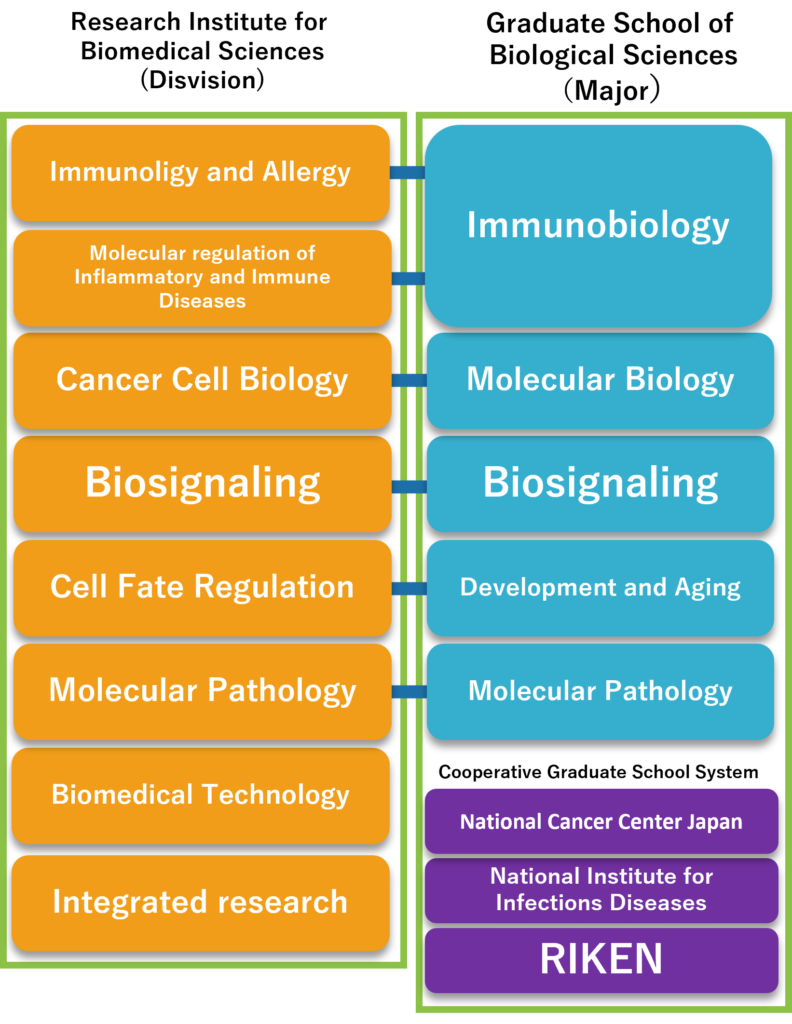About RIBS
Message
Our mission is “to contribute to clarifying the roots of life and developing the life sciences and medicine, to support active and healthy human life. ”
 Director,
Director,Research Institute for
Biomedical Sciences
Atsushi Ochiai
The Research Institute for Biological Sciences was established in 1989 at the Tokyo University ofSciences to facilitate research and education in biomedical sciences.
Unique innovative projects, especially in the field of biomaterial science, were conducted in our institute. In 1995, Professor Tomio Tada, the founder of immunology in Japan, was invited to become the director; under his leadership, the research institute developed as a well-known international research center for immunology. Rapid progress in biomedical sciences, genetics of higher animals, analytical methods, and molecular biology has facilitated cross-border sciences in various fields. This situation has also led to reorganization of our institute. Over the last 10 years, the institute’s research field has also expanded to medical and translational sciences, as reflected in its new name, the Research Institute for Biomedical Sciences in 2012, and in the formation of the Center for Animal Disease Models in 2013. In 2014, our university formulated a strategy to enhance research activities by setting four priority areas of research field including medical and life science, and fully promoting original research.
In accordance with this policy, and with strong support by the university, our institute has launched a new division, named the Division of Biomedical Technology, in collaboration with other faculties in our university, and the National Cancer Center, by using a cross appointment system.
To further promote joint research, and to widen collaboration with other institutions, the Division of Collaborative Research was renamed the Division of Integrated Research in April 2020, and its activities have been further expedited. In addition to research of immunology, we aim to promote basic research, including embryology, neurology and inflammation, and to conduct a wide range of medical research for cancer and intractable diseases. In addition, to enhance our research activities with government and private funding, we invited a research group with significant achievements in translational research to work with us, and in April 2018, we established a new division: the Division of Molecular Regulation of Inflammatory and Immune Diseases.
These are obviously new challenges for our institute. Thus, the Research Institute for Biomedical Sciences has been changing and developing. Whereas applied sciences and translational research are clearly important, understanding of basic biological processes is often fruitful in unexpected ways. Accordingly, our institute must continuously develop as a hub for biomedical investigations, in our university and beyond. The Graduate School of Biological Sciences has been established as an attached school to the institute, and it has masters and doctoral programs in the biological sciences, and we enroll 20 to 30 students each year.
The most important principles of our institute are curiosity, respect for life, and sympathy to human suffering, and in the Graduate School of Biological Sciences, we aim to produce researchers and engineers who understand these principles.
About Institute
The mission
Living organisms are highly organized entities constituting genes, cells and tissues. The dynamic changes along the time axis of the development, aging and regeneration of tissues and the adaptive system implemented in divergent organs such as the brain, nerves and immune systems represent a complex system. Therefore, a degree of hierarchical complexity that involves elaborate quality-control mechanisms and their interactive outputs characterize the living organisms. The disease is developed as a result of the perturbation of these complex systems. It is thus important for us to create novel biological concepts by bringing all the scientific knowledge and technologies of life science together to fully understand the complex biological systems. That is the ultimate goal of all members of our institute. In addition, our educational system in that the Graduate School of Biological Sciences is associated with the Research Institute for Biomedical Sciences also facilitates the research progress. The students can achieve scientific breakthroughs and acquire valuable skills by joining cutting-edge research groups headed by faculty members of the institute.


